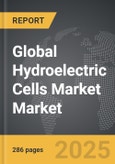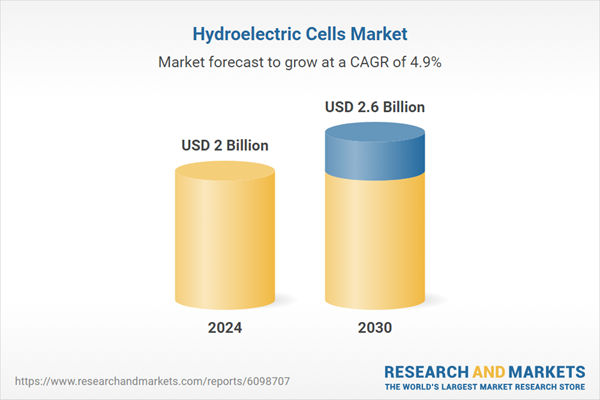Global Hydroelectric Cells Market - Key Trends & Drivers Summarized
What Are Hydroelectric Cells and Why Are They Gaining Scientific and Industrial Attention?
Hydroelectric cells (HECs) are an emerging class of clean energy devices capable of generating electricity through water dissociation without the use of external energy inputs or electrochemical reactions involving traditional fuel cells. These cells rely on nanostructured metal oxide surfaces - such as zinc oxide, titanium dioxide, or graphene derivatives - to catalyze the separation of water molecules into hydrogen and oxygen ions under ambient conditions, creating a continuous flow of electrons and ions to produce direct current (DC) electricity.Unlike conventional hydropower or hydrogen fuel cells, hydroelectric cells do not require pressure differentials, turbines, or gas storage. Their potential lies in localized, low-energy electricity generation from plain water - offering a safe, scalable, and emission-free alternative for powering low-wattage devices and sensors. As global attention turns to clean, decentralized, and nano-enabled energy systems, hydroelectric cells are being investigated for their promise in portable electronics, smart sensors, and off-grid energy applications.
How Are Material Science and Nanoengineering Enhancing HEC Performance?
The viability of hydroelectric cells is fundamentally tied to the properties of the nanomaterials used on the electrode surfaces. Advances in material science are enabling enhanced ionic conductivity, surface charge distribution, and water-splitting efficiency. Researchers are exploring layered composites, defect-rich surfaces, and heterostructure designs to improve the water dissociation kinetics and increase voltage and current outputs under ambient conditions.Graphene oxide, bismuth vanadate, and cerium-doped nanostructures are among the materials being tested for their potential to maximize electron transport and sustain prolonged operation without degradation. Innovations in electrode architecture, such as porous scaffolds and 3D-printed nanostructures, are also being introduced to increase active surface area and water retention. These material advances are pivotal for scaling up hydroelectric cells from lab prototypes to commercially deployable solutions.
Which Applications and Markets Are Driving Research and Development of HECs?
Currently, the primary interest in hydroelectric cells lies in their ability to support ultra-low power applications such as environmental sensors, remote monitoring devices, Internet of Things (IoT) modules, and low-consumption LEDs. Their silent, emission-free, and water-only operation makes them ideal for deployment in rural, marine, or off-grid settings. Research institutions and university labs are leading the development, often backed by clean energy innovation grants and nanotechnology funding.While the technology is still largely in the experimental and early commercialization phase, growing interest in sustainable micro-energy sources is drawing attention from defense sectors, consumer electronics startups, and industrial monitoring equipment manufacturers. India has been a notable contributor to hydroelectric cell development, with several academic groups demonstrating working prototypes. Global collaborations are forming to explore commercialization pathways and validate performance metrics under real-world conditions.
The Growth in the Hydroelectric Cells Market Is Driven by Several Factors…
The growth in the hydroelectric cells market is driven by several factors including advances in nanomaterials engineering, the rising demand for decentralized renewable power sources, and the need for low-cost, maintenance-free energy systems for small-scale applications. Technologically, the ability to generate electricity from water using metal oxide-based nanostructures under ambient conditions is reshaping the concept of sustainable microgeneration.From an end-use perspective, increasing demand for self-powered IoT devices, sensor networks, and standalone renewable systems is accelerating R&D activity. Environmental concerns, miniaturization of electronics, and the global push for zero-emission energy sources are all contributing to market momentum. While still at an early stage, hydroelectric cells represent a frontier in clean energy innovation with significant future potential as performance and scalability challenges are gradually overcome.
Report Scope
The report analyzes the Hydroelectric Cells market, presented in terms of market value (US$). The analysis covers the key segments and geographic regions outlined below:- Segments: Metal Oxide (SnO2 Metal Oxide, Al2O3 Metal Oxide, ZnO Metal Oxide, TiO2 Metal Oxide, MgO Metal Oxide, SiO2 Metal Oxide); Application (Portable Application, Stationary Application, Automotive Application, Other Applications).
- Geographic Regions/Countries: World; United States; Canada; Japan; China; Europe (France; Germany; Italy; United Kingdom; Spain; Russia; and Rest of Europe); Asia-Pacific (Australia; India; South Korea; and Rest of Asia-Pacific); Latin America (Argentina; Brazil; Mexico; and Rest of Latin America); Middle East (Iran; Israel; Saudi Arabia; United Arab Emirates; and Rest of Middle East); and Africa.
Some of the 37 companies featured in this Hydroelectric Cells market report include -
- Andritz Hydro
- BC Hydro
- Brookfield Renewable Partners
- China Three Gorges Corporation
- China Yangtze Power Co., Ltd.
- Duke Energy
- Eagle Creek Renewable Energy
- Engie
- General Electric (GE)
- Iberdrola
- Innergex Renewable Energy
- National Hydroelectric Power Corporation (NHPC)
- NHDC Limited
- Nova Scotia Power
- Ormat Technologies
- RusHydro
- Statkraft
- TransAlta Renewables
- Voith Hydro
Key Insights:
- Market Growth: Understand the significant growth trajectory of the SnO2 Metal Oxide segment, which is expected to reach US$727.3 Million by 2030 with a CAGR of a 6.4%. The Al2O3 Metal Oxide segment is also set to grow at 5.6% CAGR over the analysis period.
- Regional Analysis: Gain insights into the U.S. market, valued at $536.7 Million in 2024, and China, forecasted to grow at an impressive 9% CAGR to reach $555.5 Million by 2030. Discover growth trends in other key regions, including Japan, Canada, Germany, and the Asia-Pacific.
Why You Should Buy This Report:
- Detailed Market Analysis: Access a thorough analysis of the Global Hydroelectric Cells Market, covering all major geographic regions and market segments.
- Competitive Insights: Get an overview of the competitive landscape, including the market presence of major players across different geographies.
- Future Trends and Drivers: Understand the key trends and drivers shaping the future of the Global Hydroelectric Cells Market.
- Actionable Insights: Benefit from actionable insights that can help you identify new revenue opportunities and make strategic business decisions.
Key Questions Answered:
- How is the Global Hydroelectric Cells Market expected to evolve by 2030?
- What are the main drivers and restraints affecting the market?
- Which market segments will grow the most over the forecast period?
- How will market shares for different regions and segments change by 2030?
- Who are the leading players in the market, and what are their prospects?
Report Features:
- Comprehensive Market Data: Independent analysis of annual sales and market forecasts in US$ Million from 2024 to 2030.
- In-Depth Regional Analysis: Detailed insights into key markets, including the U.S., China, Japan, Canada, Europe, Asia-Pacific, Latin America, Middle East, and Africa.
- Company Profiles: Coverage of players such as Albemarle Corporation, Arkema Inc., Axens, BASF SE, Clariant International Ltd. and more.
- Complimentary Updates: Receive free report updates for one year to keep you informed of the latest market developments.
Select Competitors (Total 37 Featured):
- Andritz Hydro
- BC Hydro
- Brookfield Renewable Partners
- China Three Gorges Corporation
- China Yangtze Power Co., Ltd.
- Duke Energy
- Eagle Creek Renewable Energy
- Engie
- General Electric (GE)
- Iberdrola
- Innergex Renewable Energy
- National Hydroelectric Power Corporation (NHPC)
- NHDC Limited
- Nova Scotia Power
- Ormat Technologies
- RusHydro
- Statkraft
- TransAlta Renewables
- Voith Hydro
This edition integrates the latest global trade and economic shifts into comprehensive market analysis. Key updates include:
- Tariff and Trade Impact: Insights into global tariff negotiations across 180+ countries, with analysis of supply chain turbulence, sourcing disruptions, and geographic realignment. Special focus on 2025 as a pivotal year for trade tensions, including updated perspectives on the Trump-era tariffs.
- Adjusted Forecasts and Analytics: Revised global and regional market forecasts through 2030, incorporating tariff effects, economic uncertainty, and structural changes in globalization. Includes historical analysis from 2015 to 2023.
- Strategic Market Dynamics: Evaluation of revised market prospects, regional outlooks, and key economic indicators such as population and urbanization trends.
- Innovation & Technology Trends: Latest developments in product and process innovation, emerging technologies, and key industry drivers shaping the competitive landscape.
- Competitive Intelligence: Updated global market share estimates for 2025, competitive positioning of major players (Strong/Active/Niche/Trivial), and refined focus on leading global brands and core players.
- Expert Insight & Commentary: Strategic analysis from economists, trade experts, and domain specialists to contextualize market shifts and identify emerging opportunities.
Table of Contents
Companies Mentioned (Partial List)
A selection of companies mentioned in this report includes, but is not limited to:
- Andritz Hydro
- BC Hydro
- Brookfield Renewable Partners
- China Three Gorges Corporation
- China Yangtze Power Co., Ltd.
- Duke Energy
- Eagle Creek Renewable Energy
- Engie
- General Electric (GE)
- Iberdrola
- Innergex Renewable Energy
- National Hydroelectric Power Corporation (NHPC)
- NHDC Limited
- Nova Scotia Power
- Ormat Technologies
- RusHydro
- Statkraft
- TransAlta Renewables
- Voith Hydro
Table Information
| Report Attribute | Details |
|---|---|
| No. of Pages | 286 |
| Published | February 2026 |
| Forecast Period | 2024 - 2030 |
| Estimated Market Value ( USD | $ 2 Billion |
| Forecasted Market Value ( USD | $ 2.6 Billion |
| Compound Annual Growth Rate | 4.9% |
| Regions Covered | Global |









